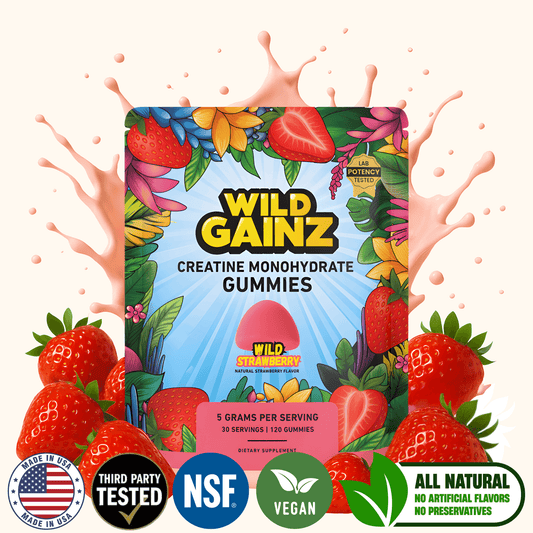Debunking Creatine for Running Myths – Facts You Should Know
Creatine has long been associated with strength training, bodybuilding, and explosive power sports. However, many runners question whether creatine can benefit endurance exercise or if it’s just a supplement for weightlifters. There’s a lot of misinformation surrounding creatine for running, so let’s break down the myths and uncover the real science behind it.
Table of Contents
- What Is Creatine?
- Common Creatine Myths for Running
- How Creatine Benefits Runners
- Best Way to Take Creatine for Running
- Addressing Side Effects and Concerns
- Creatine Gummies: The New Way to Fuel Your Runs
- Final Thoughts
What Is Creatine?
Creatine is a naturally occurring compound found in muscle cells that helps produce energy during high-intensity exercise. While the body produces creatine from amino acids, supplementing with creatine increases available energy stores, enhancing performance in various activities—including running.
Common Creatine Myths for Running
Myth #1: Creatine Only Helps Strength Athletes
Many believe creatine is only useful for bodybuilders, powerlifters, or sprinters. However, studies suggest that creatine plays a role in endurance performance, supporting recovery, hydration, and muscle efficiency.
Myth #2: Creatine Causes Water Retention and Slows Runners Down
Some runners fear creatine will cause excessive water retention, leading to weight gain that slows them down. While creatine does promote intracellular water retention, this benefits muscle function and does not impair running efficiency when taken appropriately.
Myth #3: Creatine Doesn’t Help Endurance Athletes
While creatine isn’t traditionally associated with endurance sports, research shows that it can enhance sustained energy output, delay fatigue, and improve post-run recovery. Studies on endurance sports support creatine’s benefits beyond strength training.
How Creatine Benefits Runners
Despite the myths, creatine for running offers multiple advantages. Here’s how it supports endurance athletes:
- Improves Energy Production: Creatine is essential for ATP production, providing quick bursts of energy necessary for sprints, tempo runs, and hill training.
- Enhances Recovery: Supplementing with creatine reduces muscle damage and inflammation, helping runners recover faster between sessions.
- Supports Hydration: Creatine increases intracellular water retention, preventing dehydration, which is crucial for long-distance running.
- Reduces Fatigue: By replenishing ATP stores more efficiently, creatine helps delay exhaustion, allowing you to maintain pace for longer.
- Boosts Muscle Strength: Stronger muscles enhance running economy, improving efficiency in both speed and endurance events.
Best Way to Take Creatine for Running
How Much Creatine Should Runners Take?
A standard dose of 3-5 grams daily is sufficient for most runners. Taking it consistently ensures muscles remain saturated with creatine, optimizing benefits over time.
When Should Runners Take Creatine?
Timing isn’t as important as consistency. However, taking creatine post-run with carbohydrates can enhance absorption and replenishment. Research on creatine timing indicates that its impact on performance is more related to consistency than a specific time of day.
Should Runners Load Creatine?
While some athletes opt for a loading phase (20g per day for 5-7 days), it’s unnecessary. Regular 3-5g daily intake will achieve the same muscle saturation over a slightly longer period.
Addressing Side Effects and Concerns
Does Creatine Cause Cramps or Dehydration?
No, in fact, creatine helps with hydration by increasing intracellular water stores, which can reduce the risk of dehydration and muscle cramps.
Will Creatine Make Me Gain Excess Weight?
Minimal water retention occurs in muscles, but this is beneficial for performance and recovery. It won’t negatively impact endurance if taken appropriately.
Is Creatine Safe for Long-Term Use?
Yes, extensive research concludes that creatine is safe for long-term use when taken at recommended doses. The safety and efficacy of creatine have been extensively reviewed in sports and clinical settings.
Creatine Gummies: The New Way to Fuel Your Runs
Traditional creatine supplements come in powders that require mixing and measuring. But for runners looking for a more convenient and enjoyable way to consume creatine, Wild Gainz Creatine Gummies provide an easy alternative.
Why Choose Creatine Gummies?
- Convenient & Portable: No need for shakers or water—just grab and go.
- Great Taste: No grainy texture or unflavored mix—just delicious gummies.
- Easy to Dose: Pre-measured gummies ensure you get the right amount daily.
By making creatine supplementation simple, Wild Gainz Creatine Gummies help runners stay consistent with their intake, enhancing endurance, recovery, and hydration.
Final Thoughts
Despite common misconceptions, creatine for running is highly beneficial. It improves performance, reduces muscle fatigue, enhances recovery, and helps sustain endurance efforts. While creatine is often seen as a supplement for strength athletes, its advantages for runners are backed by science.
If you’re looking for an easy and effective way to supplement with creatine, consider Wild Gainz Creatine Gummies. They make staying consistent with your training and nutrition effortless.






